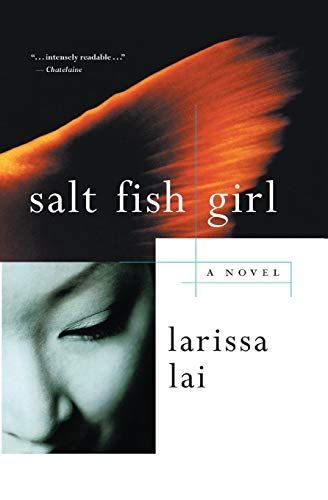
Salt Fish Girl A Novel
Reviews
i really liked this one. it is kind of entertaining to read through the lower-star reviews and see, generally speaking, (1) who is writing them and (2) what the complaints are. "show don't tell" rhetoric often doesn't get at how oration and narration, and conceptions of linear/nonlinear time and the passage of it, occur in other languages and forms of storytelling. also conceptions of "good" and "bad" science when wielded to credit/discredit speculative fiction. anyway i think that the sparse (but also, like, really illustrative, every detail is intentionally placed) and matter-of-fact manner of this book leaves tens of questions (about the characters, about this odd world, about the rules we have managed to glean and thousands of rules we have yet to see and understand from one read alone) in the wake of each sentence, and i like that. good books ought to leave you feeling like you need to reread and revisit them again. i also really want to read larissa lai's other novels and poems because how else does she play with story!! how else does she play with genre!! what else does she speculate and reveal about humanity!! questions questions
confused, need to think about it more
3.5? it gave me intense ex machina flashbacks lol. i appreciated how foreign yet familiar everything felt — names and foods and themes that were graspable, but set against the landscape of a highly fantastical world. i felt myself digging for "meaning" or "the main point", but i think this is one of those books where you have to passively absorb everything first through emotion and reaction. rlly makes you look at fish differently though, hmmm...
“This is a story about stink, after all, a story about rot, about how life grows out of the most fetid-smelling places” Salt Fish Girl is no ordinary offering; in fact, it is very clearly cyberpunk, specifically biopunk. It’s also, in part, magical realism—as it interweaves mythological components. This intersectionality in terms of genre makes for a uniquely fascinating contribution to the cyberpunk sub-genre. “I was a sheltered child, living out my parents’ utopian dream as though it were reality. They did not show me the cracks. And out of loyalty and love for them, when I sensed the cracks, I refused to see them. But of course this unspoken pact could not last.” Miranda grows up in a futuristic Canada that is dominated by corporations while struggling with being a minority. On top of her not being around people from her own culture, she also is born with a strange smell, reminiscent of “cat piss” that seems to wean as she gets older but results in an isolating and challenging childhood. “I was a sheltered child, living out my parents’ utopian dream as though it were reality. They did not show me the cracks. And out of loyalty and love for them, when I sensed the cracks, I refused to see them. But of course this unspoken pact could not last.” Paralleling Miranda’s story is one of Nu Wa, a creation story of a Chinese goddess who births humankind and eventually chooses to become one, born as Nu Wa. Similarly to Miranda, Nu Wa’s experience is one of poverty and classism that allows for her exploitation. These two stories elegantly depict complex systemic issues, such as stratification of class that transcends generations. “When you own nothing, it’s hard to believe you have anything to lose. I can’t say what it was that made me follow the strange woman, except that it took more weakness than strength.” Nu Wa and Miranda are both taken advantage of by people in a higher class, using their poverty to co-opt their intellectual property and personhood. For Miranda’s family to navigate society more easily, her father tries to trace the source of a rumor that Miranda’s smell is curable. Corporations are also mass-producing human clones as a source of cheap labor, it appears that biotechnologies, both sanctioned and unsanctioned by these corporations, is more pervasive than people are aware. As more and more people seem to be contracting something dubbed the “dreaming disease”—which appears to unlock generational memories—people are committing suicide and disappearing. And Miranda is beginning to remember some things herself. “Why shed blood when people can be brought and sold so easily?” The story is steeped with culture and the cultural issues that come along with them. From the different smell of other ethnicities cause ostracization to family dynamics and the very particular ways the corporations leverage the marginalization of the main characters. A fringe benefit of this authenticity is how the cyberpunk motifs resonate much more profoundly. “What is the point of honour if it is always used against you?”
Enchanting, beautiful, intriguing, but somehow just a little off. Could have gone through another draft because some things just don't really click or miss the mark by a little bit, preventing this book from becoming a future classic.
Strange and absolutely stunning.